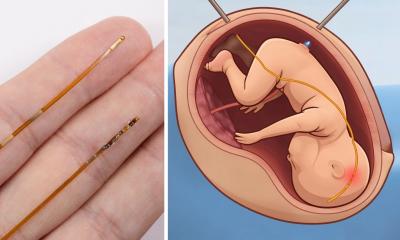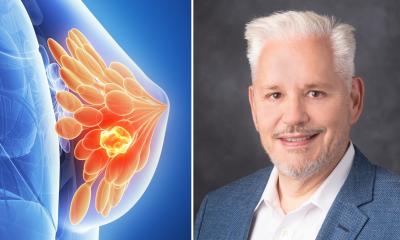Image source: Adobe Stock/gpointstudio
News • Surgical navigation system
Breast cancer localization: study puts new device to the test
University of Cincinnati (UC) Cancer Center researchers found a seed device that acts as a GPS for surgeons to locate and remove breast and lymph node tumors was safe and effective.
The feasibility study evaluating the use of the devices, called SmartClips, was recently published in the journal The American Surgeon.

Image source: University of Cincinnati
UC’s Jaime Lewis and her colleague Elizabeth Shaughnessy helped test the SmartClip devices as they were being developed.
“We went a few times and saw the different prototypes, worked with them, and provided feedback. Then we were one of the first institutions to use the SmartClips when they became commercially available in 2020,” said Lewis, a Cancer Center physician-researcher and associate professor of surgery in the UC College of Medicine. “Now, I’ve done more surgeries than any other surgeon with the SmartClip.”
The research team reviewed 100 patients whose tumors were marked, or localized, using SmartClips. Lewis said using SmartClips was equivalent in aiding surgeons in localizing and removing the tumor compared to the traditional technique using a needle and wire and may be safer when used to mark lymph node tumors for excision.
The traditional needle and wire technique is typically done on the day of surgery and can be cumbersome and uncomfortable for patients. SmartClips can be implanted at any time prior to surgery, and Lewis said surgeons can quickly learn the technique needed to use them in the operating room.
I think the real benefits from my perspective are the facilitation of the operative schedule and not interfering with the surgeons’ choice of incision
Jaime Lewis
“The patient doesn’t have this needle and wire coming out of their breast that we’re trying to work around the day of surgery that may limit our ability to use a certain incision,” Lewis said. “There’s always a risk when patients are undergoing localization that they can pass out. So if the localization is performed on a different day, we reduce the need to cancel their surgery and delays in localization don’t slow down the progress of the day.”
Lewis said using SmartClips improves efficiency since radiologists can schedule the implantation when it works best for them, and then the day of surgery is also shorter. “Most people prefer two visits rather than one very long day, and they like the idea of not having the needle and wire sticking out,” she said. “But I think the real benefits from my perspective are the facilitation of the operative schedule and not interfering with the surgeons’ choice of incision.”
SmartClips are one of a number of devices, including radioactive, radiofrequency and magnetic seeds, that have been introduced to better localize breast tumors. Lewis said the move to these new devices and eliminating the wire and needle technique is a positive development for patients and clinical teams, though a full cost-benefit analysis should be conducted in the future.
“There’s still some technical glitches with it, but I do think that a device like this or another iteration of the future is definitely where we should go,” she said. “Patients definitely seem to be happier, I think surgeons are happier, the radiologists are happier, and it makes the flow of patients through procedures much better. There are some improvements that could be made, but getting rid of needles and wires will help with a number of those things.”
Source: University of Cincinnatti
31.10.2023











